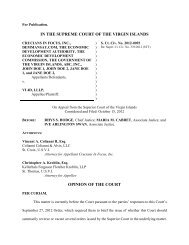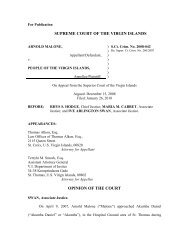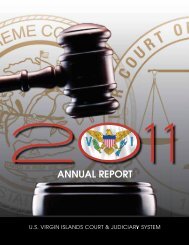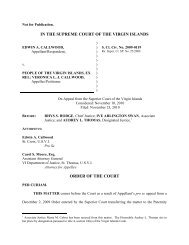IN THE SUPREME COURT OF THE VIRGIN ISLANDS OPINION OF ...
IN THE SUPREME COURT OF THE VIRGIN ISLANDS OPINION OF ...
IN THE SUPREME COURT OF THE VIRGIN ISLANDS OPINION OF ...
You also want an ePaper? Increase the reach of your titles
YUMPU automatically turns print PDFs into web optimized ePapers that Google loves.
Stevens v. People of the V.I.<br />
S. Ct. Crim. No. 2007-126<br />
Opinion of the Court<br />
Page 17<br />
possession of ammunition. See id.; United States v. Daniel, 518 F.3d 205, 208 (2008). “Without<br />
any such mechanism, like the licensing process for possessing a firearm, see 23 V.I.C. § 455<br />
(1993 & Supp. 2008), the People could not show that [Stevens] was not authorized to possess<br />
ammunition. “ See Daniel, 518 F.3d at 208-09. Under these circumstances, it is clear that the<br />
evidence was not sufficient to sustain Stevens’ conviction on Count Nine.<br />
While Stevens did not raise this argument in the Superior Court, and he has not raised it<br />
on appeal, “‘the failure to prove one of the essential elements of a crime is the type of<br />
fundamental error which may be noticed by an appellate court notwithstanding the defendant's<br />
failure to raise it in the [trial] court.’” United States v. Gaydos, 108 F.3d 505, 509 (3d Cir. 1997)<br />
(quoting United States v. Zolicoffer, 869 F.2d 771, 774 (3d Cir.1989)); accord United States v.<br />
Wright-Barker, 784 F.2d 161, (3d Cir. 1986) (reviewed sufficiency of the evidence for plain<br />
error as it pertained to certain defendants even though those defendants did not preserve the issue<br />
below and did not raise it on appeal)), superseded on other grounds by statute, United States v.<br />
Martinez-Hildago, 993 F.2d 1052, 1056 (3d Cir. 1993). Like the Court of Appeals for the Third<br />
Circuit, we “believe that affirming a conviction where the government has failed to prove each<br />
essential element of the crime beyond a reasonable doubt ‘affect[s] substantial rights,’ and<br />
seriously impugns ‘the fairness, integrity and public reputation of judicial proceedings.’” Id.<br />
(citing United States v. Olano, 507 U.S. 725, 732, 113 S.Ct. 1770, 1776, 123 L.Ed.2d 508<br />
(1993)). Accordingly, although this Court does not, as a general rule, consider arguments not<br />
raised by the parties, Stevens’s general challenge to the sufficiency of the evidence, coupled with<br />
the plain error before us, requires not only that we notice the error, but that we reverse his Count<br />
Nine conviction because of the error.
















